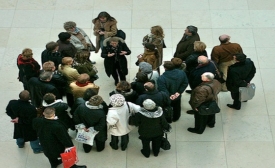poverty
When Marie Antoinette wanted to escape the confines and pressures of courtly life, she retreated to her quaint Petit Hameau where she and her companions donned their finest peasant frocks and pretended to be poor. A century later, fashionable Londoners took that pauper fantasy to a new extreme -- nocturnally touring East London's slums, where they gawked at ladies of the night and coined the phrase "slumming it."
Infectious diseases that leave victims with cognitive deficits or malnutrition instead of killing them do not typically elicit fundraising galas or research dollars, especially when the illnesses disproportionately impact the poorest of the poor. But a new coalition of funders is now trying to throw these neglected diseases a financial lifeline.
Colombia, led by its second largest city Medellin, has the most unequal urban areas in Latin America, according to the United Nations. While Latin America as a whole has been making strides to combat inequality, lowering rates of unequal income distribution across the region over the past decade, Colombia has bucked the trend, experiencing a 15 percent increase in inequality in urban areas over the last 20 years.
You might not guess it from your Internet bill, but the United States has some of the cheapest broadband in the world -- right up there with Kazakhstan, India and Bangladesh. That’s one of many surprising, and occasionally puzzling, revelations in a new report from the International Telecommunication Union, which tracks the use, cost and penetration of information networks around the world.
Africa is now home to 55 billionaires, up from previous estimates of 16-25 billionaires, new research has found. These super rich are worth a combined total of $143.88bn (£89.27bn). The UK, in contrast, is home to 84 billionaires, worth a nearly £250bn, according to the 2013 Sunday Times Rich List.
When Nitish Kumar became chief minister of the dirt-poor Indian state of Bihar in 2005, kidnapping was said to be the leading industry in the capital city of Patna. People searching for stolen cars were advised to check the driveway of a leading politician, who reportedly commandeered vehicles for “election duty.”
Mark Zuckerberg, chief executive of Facebook, announced the launch of Internet.org Wednesday, a project aimed at bringing Internet access to the 5 billion people around the world who can't afford it. The project is the latest initiative led by global-communications giants to combat market saturation in the developed world by introducing the Internet to remote and underprivileged communities.

"In a world where more have access to mobile phones than toilets, people expect to participate in shaping public policies.”
The United Nations launched a new public diplomacy initiative that aims to change how decisions are made about world affairs.







